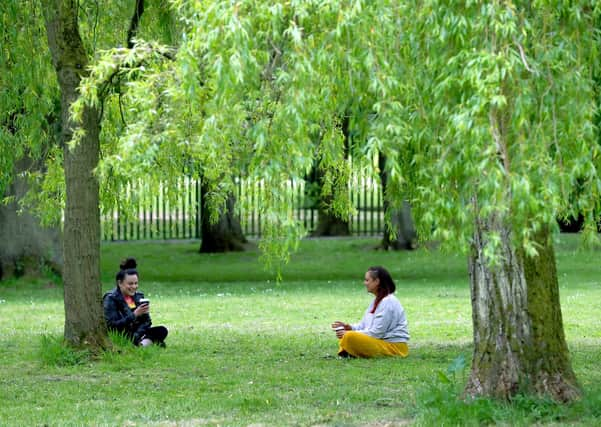What Northern Ireland folk might just miss when the lockdown ends


In many ways, lockdown has been thoroughly, relentlessly awful. Necessary, and doable, yes, but not much fun.
Being separated from family and friends, practically divorced from the outside world, unable to travel or visit a restaurant, having to homeschool and exist within the same four walls, all while being inundated with upsetting coronavirus news and worrying about the health of loved ones - it’s been hard.
Advertisement
Hide AdAdvertisement
Hide AdBut during such a remarkable time, there have been slivers of joy found amongst the many difficulties - and we might just miss some of them when a new normality emerges.


For example, we’ve been able to collectively slow down, and focus on the day-to-day. Grand plans have been cancelled, life has paused - but it has for everyone. There’s no #feeling like you’re being left behind at work, or amongst fellow parents on the playground. In some ways it’s been a relief, a moment to stop, think and recalibrate. One we might never get again.
A nightmare for some, but for others, homeschooling has been a chance to bake and garden, make extravagant home chemistry experiments, be creative and learn stuff together as a family. Understandably though, you wouldn’t want to do it forever.
The opportunities for ‘me’ time have definitely increased for a lot of us. With no friends to meet, work drinks to attend, school runs to wrangle with, fitting in a bath, or half an hour with a book, cooking from scratch, calling a friend, and spending more than three minutes painting your nails, has actually been possible.
Advertisement
Hide AdAdvertisement
Hide AdFor people newly working from home, it’s been quite the dream to get a lie-in, then just walk downstairs to ‘work’ rather than having to get up, get dressed and drive or catch a bus or train to commute. Plus, you can make yourself a nice lunch, rather than rely on plastic-wrapped, shop-bought sandwiches.
Through the Thursday night claps, getting to properly know our neighbours over the fence, supporting those in need, shopping for friends and relatives who can’t go out themselves, a sense of community has genuinely sprung up.
It may have taken a little while to adjust to the world shrinking to just our households, but getting to spend endless hours - despite the usual family bickering - with people you love, is time we might never have had in ‘normal’ life.
But just as it was difficult to transition to lockdown, many fear that the transition back to ‘normal or new normal life’ will bring challenges.
Advertisement
Hide AdAdvertisement
Hide AdCo Down counsellor, life coach and mindfulness teacher Jimmy Smyth said: ‘‘We have to leave lockdown in the past; it’s history and it can’t be changed and we are living in the present.
‘‘To do this be mindful and live in the present moment. To keep our mind focused on the present and stop it wandering, we can use meditation and mindful activities, such as walking, eating meals, showering, etc to train our mind to be present. We can aid this a lot by fully using our senses.
‘‘We also need to bring structure back into our lives. Plan our time and keep our focus on the activities of the day. Get back into the routine of work. Spend quality time with our children [talking and listening to them], other family members and friends.’’
Mr Smyth added that coming out of lockdown is a good time to rejoin the groups you were in before, perhaps even new groups.
Advertisement
Hide AdAdvertisement
Hide Ad‘‘Get back to doing what you and your family enjoy and work actively towards getting your social life back. If your children were attending groups or clubs, prior to lockdown, get them involved again.’’
And being mindful of our physical and mental health is a priority.
‘‘If you had signs or symptoms of an ailment during lockdown and didn’t get it checked out, then now is the time to see your doctor, dentist, optician or re-book any missed hospital appointments.’’
He added: ‘‘Before you go to sleep, reflect on one or two positive things you have done that day and when you wake the following morning, set yourself one or two positive goals for the day ahead. It could be a small job, a phone call to a friend or spending some play time with your children.
Advertisement
Hide AdAdvertisement
Hide Ad‘‘Make sure that you are getting adequate exercise and sleep and enjoying a healthy diet.
At the best of times we can be struggling with certain aspects of our lives, such as employment, relationships, financial concerns. If any of these are causing you worry, stress or concern then ask for help. Continuing to struggle on your own will only make things worse’’
Mr Smyth acknowledged many people who will not be able to get through this on their own and who will need help, like therapy or counselling in order to get themselves back to a normal life.
‘‘If this is you; then please seek help as soon as possible. Don’t leave it too late.If you need help, then reach out.
Advertisement
Hide AdAdvertisement
Hide Ad‘‘You can find that help through speaking to your doctor, staff at your health clinic, Citizens Advice, charities that provide free counselling and therapy sessions.
‘‘After lockdown many things will change, many for the better, and some things will be different, but there will also be new opportunities. Let us move into the future together.’’
Dr Julie Anderson, a NI consultant psychiatrist, worries that some individuals may have avoided seeking help for mental health issues during the lockdown.
She added that those with
anxiety disorders may find coming out of lockdown especially challenging.
Advertisement
Hide AdAdvertisement
Hide Ad‘‘Some people, who are known to our services, have actually found lockdown quite pleasant in some ways because there’s less pressure and expectation.
‘‘After lockdown there would be a concern that things could be a lot worse for them.
‘‘With anxiety disorders the difficulty can be that the more you avoid something, the harder it can get.
‘‘When things change and people start going out and about, some are going to be very scared physically around Covid and will be scared about getting unwell or picking it up.’’
Advertisement
Hide AdAdvertisement
Hide AdIn preparation for the easing of restrictions, Dr Anderson said we can address our own anxieties by letting others know how we feel.
‘‘Often just talking to friends or family about any worries or anxieties about how things might be is definitely a big help, rather than mulling those over in your own mind.
‘‘From a practical point of view, get out and about a little bit, rather than avoiding it.
‘‘For example, if you have been avoiding the shops, try and visit those gradually, but regularly, because the more you avoid things they more difficult they can get.’’
Comment Guidelines
National World encourages reader discussion on our stories. User feedback, insights and back-and-forth exchanges add a rich layer of context to reporting. Please review our Community Guidelines before commenting.